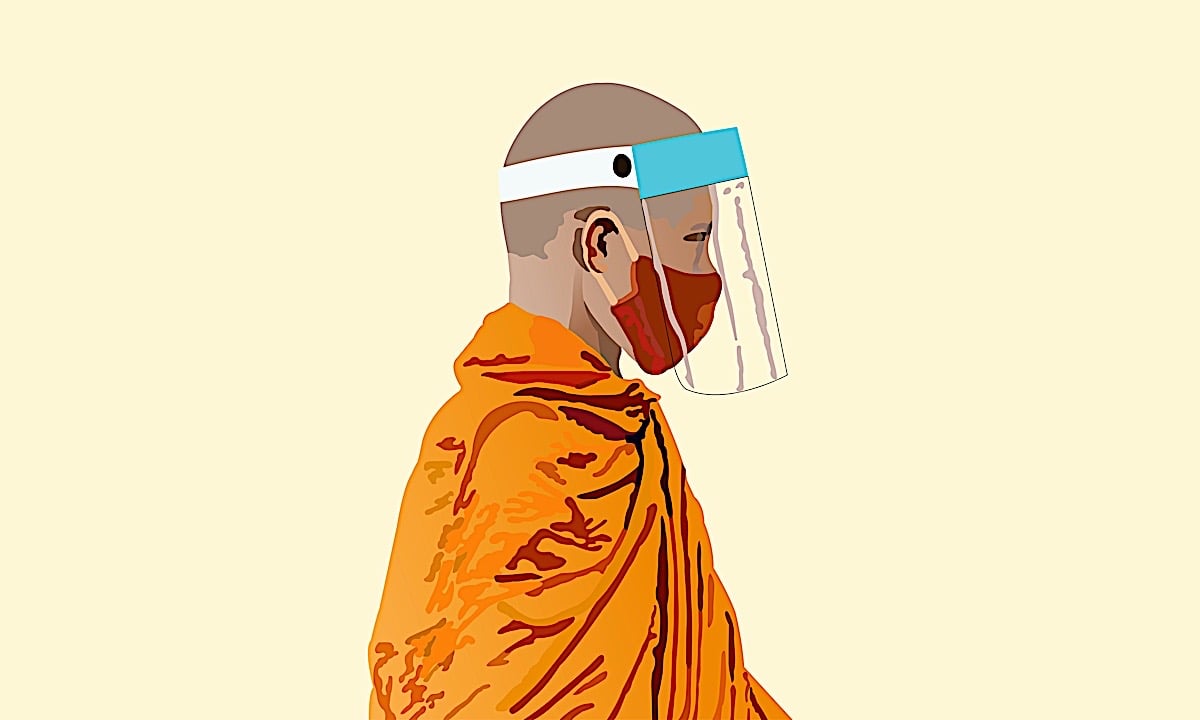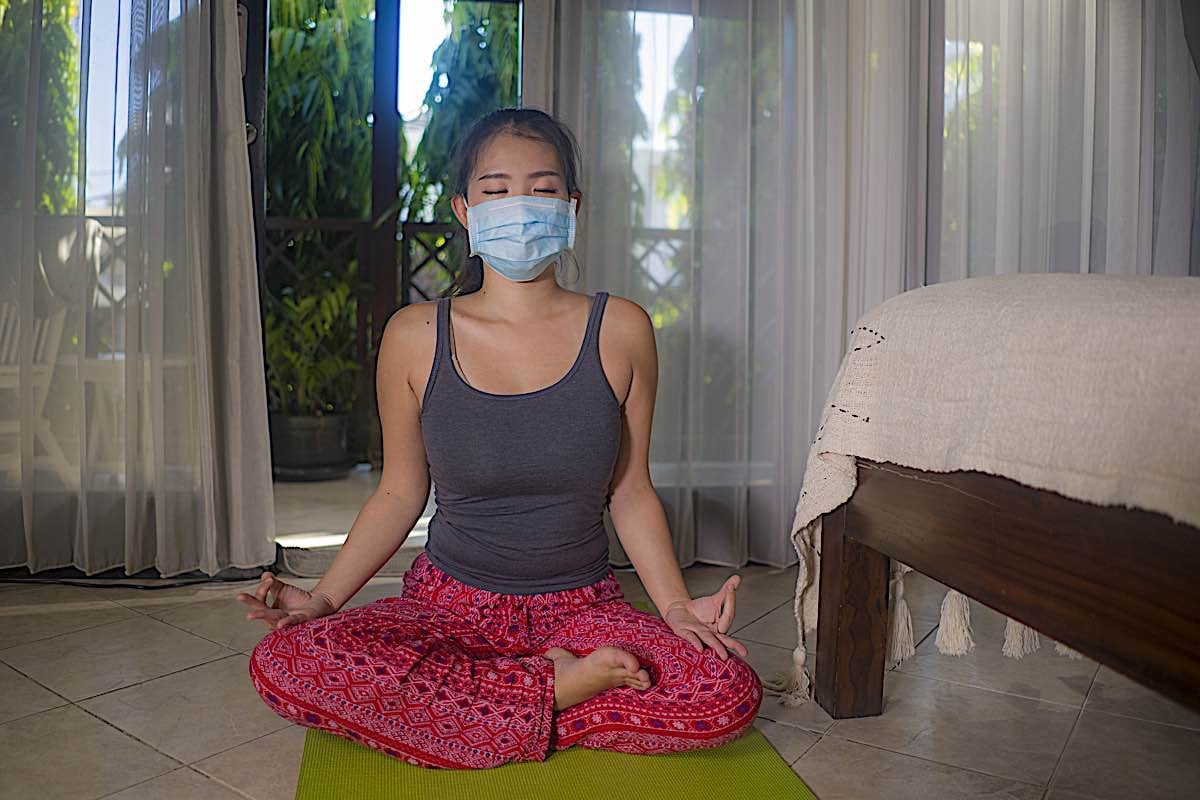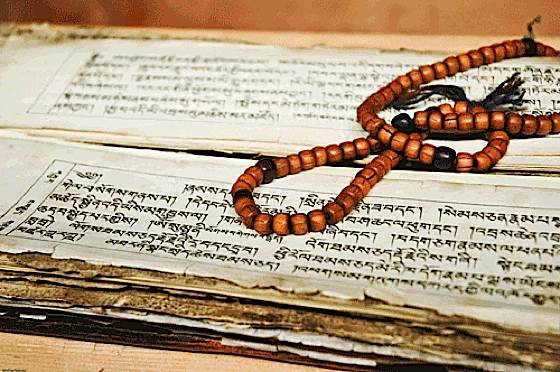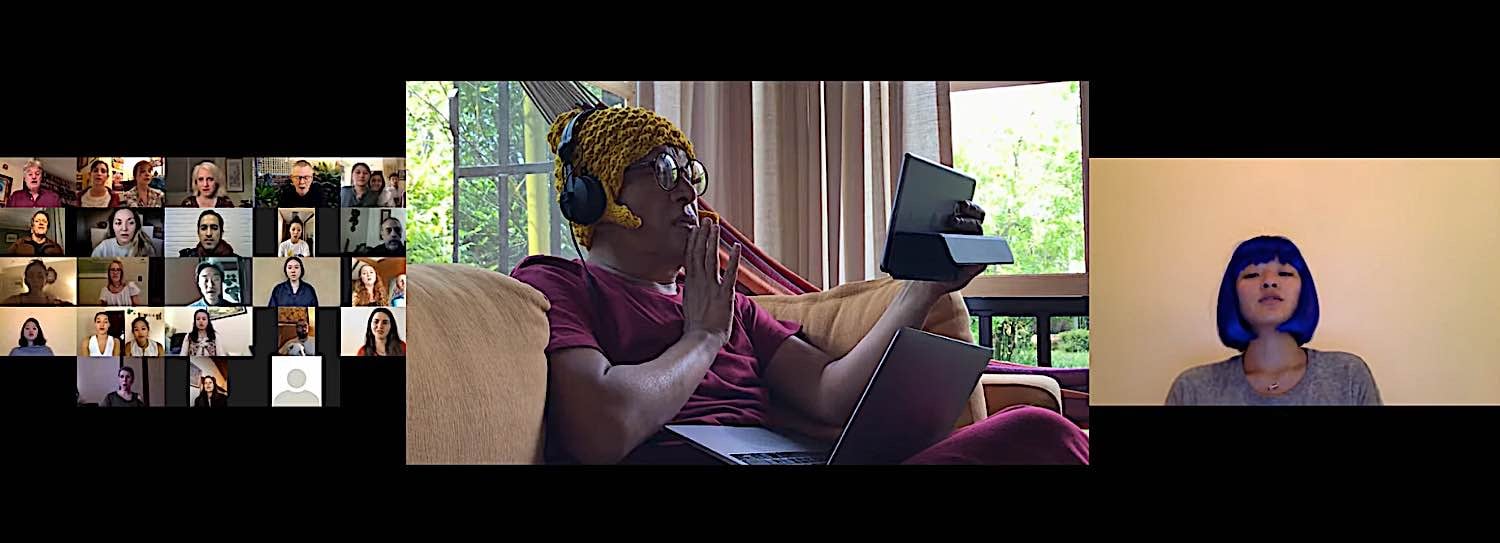Buddhist inspiration during lock-down or quarantine: practice, learning, gratitude, connecting, acceptance
In these uncertain times, we can still find ways to practice, improve and grow. This pandemic has affected every aspect of our lives. Although finding inspiration and motivation is never easy, Buddhist Refuge and practice can help us both cope and grow in difficult times by encouraging us to practice, learn, be grateful, connect with others and accept. We can still connect with the teachings and the wider community online. Buddhist teachings are above all practical, directly guiding us to:
- overcome fear
- remain in the present moment
- cultivate compassion
- understand and foster our connectedness to all beings
- transform our worries into practice.[1]
Feature by John Peterson
[Biography on bottom of the feature.]
Keep practicing

Though it is certainly difficult to remain motivated during confusing and uncertain times, Buddhist teachings provide us with helpful coping methods, the best known of which are:
- Overcoming our fears [For a feature on Buddha’s teachings on overcoming fear, see>>]
- Mindfulness [For a feature 12 ways Mindfulness can help us during the Pandemic see>>]
- Practice Compassion, Metta (loving kindness) and Bodhicitta [For a feature on Metta Compassion practices, see>>]
- Meditate: Buddha taught many methods for reflecting and meditating including breath, analytical, and visualizing methods [For a feature comparing the styles of meditation, see>>]
- Comprehension and connection: learning and meditating on Sunyata (Shunyata), the doctrine of Oneness and Emptiness to foster connectedness to all beings [For a feature on Sunyata see>>]

Skillful methods
These skillful methods can help us come to terms with our distressing pandemic situation.
The positive spin on “alone time” can be that we get to do a lot of the things we love or have been putting off — learning, practice, hobbies, skills, or any constructive focus. That is great when talking about practicing Buddhism, as it implies that we will not lack the time to keep practicing and remain in touch with it. [See this feature with teacher Kimberly Brown, author of Stead, Calm and Brave>> ]

Turn your home into a peaceful place
You can turn your home into the perfect environment and try to make yourself feel like you’re in a retreat. If practicing Buddhism on your own is not necessarily your style, you can always get a coach and have online sessions, to help you concentrate and not lose your focus and progress. Many teachers and schools have weekly online teachings, most free. [For example, Lamrim teaching series on Sundays at Gaden for the West>> ]
Never Stop Learning
Inspiration and Wisdom come from learning. The most obvious source is sutra teachings. The majority of popular Buddhist sutras are freely available online without cost, notably at Buddhist Sutra, with hundreds of English-translated sutras alphabetized at >>

Isolation time and lockdowns are the ideal time to learn new methods, new techniques, and new practices. There are plenty of online courses related to Buddhism, together with videos of past teachings, books, and podcasts created by monks, lamas and lay teachers. For example (some free, such as YouTube channels, some formal courses for a fee):
- Buddha Weekly YouTube videos>>
- Online learning from Harvard University (some free)>>
- Buddha Weekly Sutra Features (70 features) with full English translations>>
- FPMT courses>>
- Online courses from Shambala>>
- Tricycle courses>>
- Buddhism edX courses>>
- Udemy courses>>
There are infinite resources when it comes to spreading and extending your Buddhism knowledge online (many free.) When you start opening up to learning more and more, inspiration will almost immediately come to you.

Be grateful — practicing happiness
Even if the pandemic has taken away our favorite places, activities or — in the worst case — even loved ones, our attitude can still be a positive one. We should be grateful and thankful for what we have and always appreciate the positive things and feelings. [For instance, this helpful feature How Your Faith Can Make You Happier, 7 Practices>> ]

Buddha taught the Eightfold Path — literally the path to practicing happiness. [For a feature on the Eightfold Path see>>]
Most of us are lucky enough to have been blessed with more than we need, and for that we should always be happy. And when we’re happy, we feel inspired and we want to start doing things for others and sharing gratitude with the world.

Connecting with all beings
Even if time may be on our side while “staying at home” it is still very easy to lose touch with our friends and families, especially with modern technologies. Maintaining our relationships in the online environment is not as easy as it sounds, and it is understandable that sometimes you just want to log off and be at your own peace.
However, it is equally important that we not lose touch with our friends, family, sangha, and teachers. Isolation without wisdom can certainly bring us sadness and loneliness. “Treat obstacles as an opportunity to practice” is paraphrased sage advice from the Buddha.

Maintaining our relationships online
Luckily, technology is on our side, so we can maintain our relationships online, until better times will come and we can go back to meeting loved ones in person.
At the same time, now is a good time to generate our feeling of connecting with all sentient beings: friends, family, strangers, even “enemies.”

Practicing Metta and Bodhicitta
Metta and Bodhicitta (Bodhichitta) meditation, where you visualize all beings surrounding you receiving your loving-kindness — with your enemies in front of you and closest to you — is a wonderful way to generate that feeling of Oneness. In Buddhism, strangers and enemies should be foremost in our loving-kindness thoughts. Tonglen practice, a Tibetan Buddhist practice of “giving merits and kindness” and receiving other’s pain and obstacles, in turn, can be a very profound “connection” practice. [For a video meditation on Tonglen, see>> ]

Our creativity and inspiration come from inside — from our Buddha Nature or higher self — which is one reason we need to always find time for Dharma practice and Bodhicitta. Compassion and connection, surrounding yourself by love — and spreading your own love — can be important to your progress on the path and your happiness.
Accept and Deal with the Present Moment
As we pass one full year in this terrible pandemic, it may be difficult to “cope” if we dwell on the future and past. Buddha taught, above all, to remain mindful in the present moment. It is very important that we become aware of everything that is going on and, besides that, to simply come to terms with what’s going on around us — but remaining in the present moment.

If you start to panic and wonder when everything will go back to normal (the future that may not come you will only be adding more stress and negative thoughts to your mind, which will lead to even more negative feelings. In the Great Discourse on Mindfulness — the Mahasatipatthana Sutta — Buddha taught us to focus our awareness of mind, body, feelings in the present moment.
Buddha taught mindfulness
Buddha taught that mindfulness was, “the direct path for the purification of beings, for the overcoming of sorrow and lamentation, for the disappearance of pain & distress, for the attainment of the right method, and for the realization of Unbinding.” [See the full Mahasatipatthana Sutta in English here>> ]

Learn to accept that this is the situation in the world, and the best thing we can do is embrace it and go through it together — mindful, compassionate and in Oneness with our fellow beings. Once you master this, you will be inspired by every mindful moment, even during Pandemic lockdown or quarantine.
NOTES
[1] Five helpful Buddhist methods during Covid 19 on The Conversation>>
More articles by this author
Search
Latest Features
Please support the "Spread the Dharma" mission as one of our heroic Dharma Supporting Members, or with a one-time donation.
Please Help Support the “Spread the Dharma” Mission!

Be a part of the noble mission as a supporting member or a patron, or a volunteer contributor of content.
The power of Dharma to help sentient beings, in part, lies in ensuring access to Buddha’s precious Dharma — the mission of Buddha Weekly. We can’t do it without you!
A non-profit association since 2007, Buddha Weekly published many feature articles, videos, and, podcasts. Please consider supporting the mission to preserve and “Spread the Dharma." Your support as either a patron or a supporting member helps defray the high costs of producing quality Dharma content. Thank you! Learn more here, or become one of our super karma heroes on Patreon.
John Peterson
Author | Buddha Weekly
John Peterson is a journalist with 4 years’ experience working as an essay writer at best essay writing service He is a professional mini-tennis player and he has written a novel “His heart”. You can find him at Facebook.













